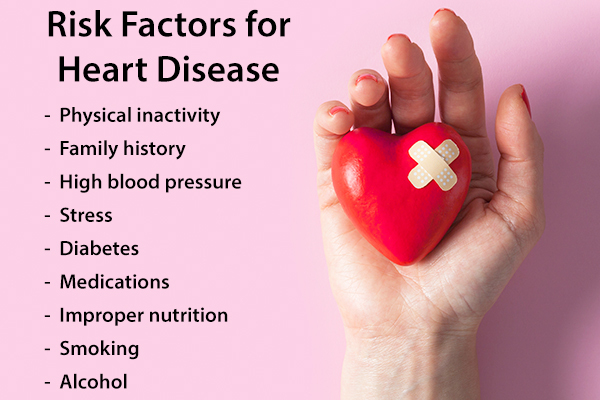In this article:
The heart is a vital muscular organ in the human body. It supplies blood to the rest of the body through the circulatory system.

The heart is positioned in the middle mediastinum in humans and is formed anatomically of three cardiac layers (the endocardium, myocardium, and epicardium) and separated into four chambers. The innermost layer (endocardium) and connective tissue compose the four cardiac valves.
The sinoatrial (SA) and atrioventricular (AV) nodes coordinate the heart’s contraction by its conduction system, circulating blood at a homeostatic rate and rhythm of 60–100 bpm in adults.
Ways to Keep Your Heart Healthy
A few changes in your daily routine can go a long way in maintaining heart health. Here’s what you can do:
1. Improve your diet and nutrition

Dietary modifications are essential for a healthy heart. The American Heart Association recommends the DASH (Dietary Approaches to Stop Hypertension) diet, which includes fruits, vegetables, whole grains, fish, nontropical vegetable oils, low-fat dairy products, skinless poultry, nuts, and legumes. (8)
Limiting dietary sodium and sugar intake also contributes to a healthy heart. Supplements such as fish oils (omega-3 fatty acids) can also increase HDL (good cholesterol) and have a positive effect on plaque buildup in the arteries.
2. Exercise
Routine exercise (30 minutes of moderate intensity) can have many benefits to the heart. Exercise can include aerobic workouts such as swimming, riding a bicycle, doing yard work, hiking, and skipping rope.
Benefits of regular exercise include better exercise tolerance, lower blood pressure, reduced LDL and total cholesterol levels, improved HDL cholesterol levels, and increased insulin sensitivity. (9)
3. Maintain a healthy weight
People who are overweight or obese are much more likely to develop heart disease than those with a healthy weight.
If you belong to this high-risk group, healthy weight management through a nutritious diet and regular exercise is an important step for reducing your cardiovascular risk. The goal is to keep your body mass index (BMI) below 25.
If you are struggling to shed the extra pounds, consult a dietitian/nutritionist as well as your doctor to come up with a comprehensive weight-loss plan.
4. Monitor lipid levels
Routine follow-ups with your primary care physician to monitor lipid levels can ensure your lipid levels are in reference range and prompt treatment when required.
5. Get adequate sleep

According to the Centers for Disease Control and Prevention (CDC), adults (18–60 years) should have an average of 7 or more hours of sleep per night, and teens (13–18 years) are recommended 8–10 hours per night.
Lack of sleep has been associated with increased blood pressure, obesity, and type 2 diabetes mellitus (DM), all contributors to heart disease. (10)
6. Manage stress
Cortisol is upregulated by the adrenal glands during periods of stress. Managing stress levels can help keep cortisol levels low and can contribute to a healthy heart.
7. Go for regular health checkups
If you are already under the care of a cardiologist, routine follow-ups are advised to better control your disease. Preventative measures are important as well, and routine visits to your primary care physician are also recommended.
Preventive Tips for a Healthy Heart
Depending on the type of heart disease, specific precautions can be taken per individual, such as the following:
- Medication compliance is vital to control your current disease state and to prevent further progression or exacerbations of the disease course.
- Avoiding smoking, alcohol, and illicit drug use should also be taken into account, as these habits may contribute to an underlying heart disease.
Risk Factors for Heart Disease

The following factors contribute to the development of heart disease:
- Physical inactivity: A sedentary lifestyle triggers obesity, hypertension, high cholesterol, and diabetes, all of which are major contributors to heart disease.
- Family history: Nonmodifiable risk factors that can contribute to an increment in risk of having a cardiovascular event include a history of cardiovascular event in first-degree relatives below the age of 55 in males and below the age of 65 in females.
- High blood pressure: Hypertension, or high blood pressure, implies that the blood flows through your arteries with such force that it damages the vessels from within and causes serious cardiovascular damage over time.
- Stress: High stress levels can make your arteries tight and rigid, constricting the flow of blood to the myocardial region and thereby increasing the risk of coronary heart disease, especially coronary microvascular disease.
- Diabetes: Diabetes damages your blood vessels, making you increasingly prone to cardiovascular disease, more so if it is poorly managed but otherwise too.
- Medications: Certain drugs such as anabolic steroids can damage your heart tissue over prolonged use and can increase your susceptibility to heart failure.
- Improper nutrition: Poor-quality diets are those high in refined grains, added sugars, salt, unhealthy fats, and animal-sourced foods and low in whole grains, fruits, vegetables, legumes, fish, and nuts. (11) To maintain good cardiovascular health, it is important to incorporate the DASH diet. The DASH diet incorporates fruits, vegetables, whole grains, and low-fat dietary products and discourages sugar-laden foods, red meats, and added fats. (11)
- Smoking: Smoking, alongside high blood pressure and high blood cholesterol, is one of the leading risk factors for coronary artery disease (CAD), which can further result in myocardial infarction (MI). (7) The risk of developing coronary heart disease in an individual who smokes is determined by their value of pack-years. (12) Cigarette smoking is associated with the development of acute atherothrombotic events such as stroke or heart attack and also has an impact on glucose tolerance and HDL levels. (13) Quitting smoking can decrease the risk of unwanted heart pathology significantly.
- Alcohol: Acute intoxication with alcohol (80 mg% to 250 mg%) can weaken the heart’s ability to contract. This can lead to irregular and often fast heart rhythms, which may lead to atrial fibrillation or sudden cardiac death.
When to See a Doctor
Your primary care physician should be contacted regarding heart disease, soon after suspicions or symptoms of heart disease (mentioned above) arise.
- Depending on your presenting symptoms and physical examination findings, your primary care physician may refer you to a specialist (cardiologist) and/or order the appropriate tests (EKG, echocardiogram) to better understand your symptoms.
- Emergency services (911) should be contacted if the person’s airway, breathing, or circulation is severely compromised. In other words, a pulse cannot be felt, respiratory rate is low to absent, or the person is losing significant blood or becomes unresponsive.
Most-Asked Questions About Heart Health
How many times in a year should one get a heart checkup?
It is important to address the modifiable risk factors, such as smoking, obesity, diabetes, hypertension, hyperlipidemia, unhealthy lifestyle, sedentary lifestyle, when screening for underlying cardiovascular diseases.
The current guidelines of the United States Preventive Services Task Force (USPSTF) do not recommend screening for cardiovascular diseases with regular echocardiogram or electrocardiogram (ECG).
However, practices such as dietary and physical activity counseling aim to reduce the risk factors associated with cardiovascular mortality during your regular checkup with your doctor.
What are some important points to remember regarding heart health?

Important factors to keep in mind when keeping your heart healthy include smoking cessation, increased physical activity, targeting a BP reading of <130/80 mmHg, having individualized glycemic controls for those with underlying diabetes mellitus, and lipid-lowering therapy in those with hyperlipidemias.
Final Word
Having a healthy heart is attributed to addressing various factors that may contribute to coronary heart disease. Recognizing symptoms such as sudden-onset chest pain, shortness of breath, or falling unconscious sometimes can help avoid fatal situations. It is important to discuss your heart health with your provider.
- Was this article helpful?
- YES, THANKS!NOT REALLY


